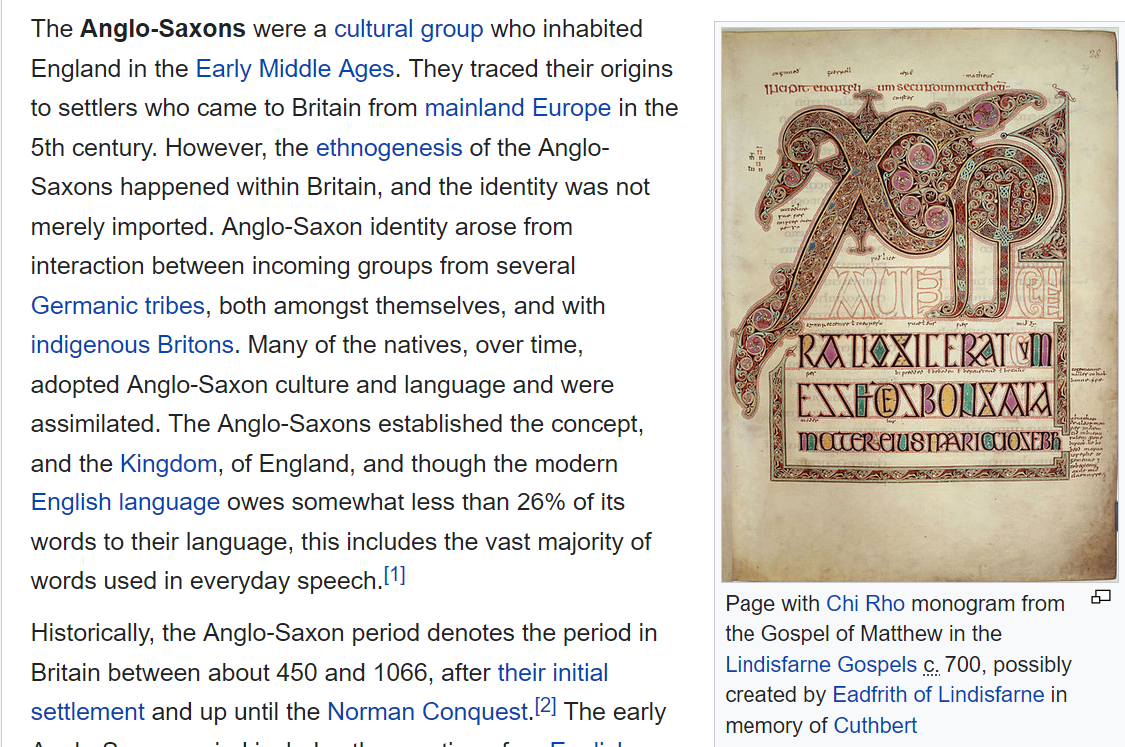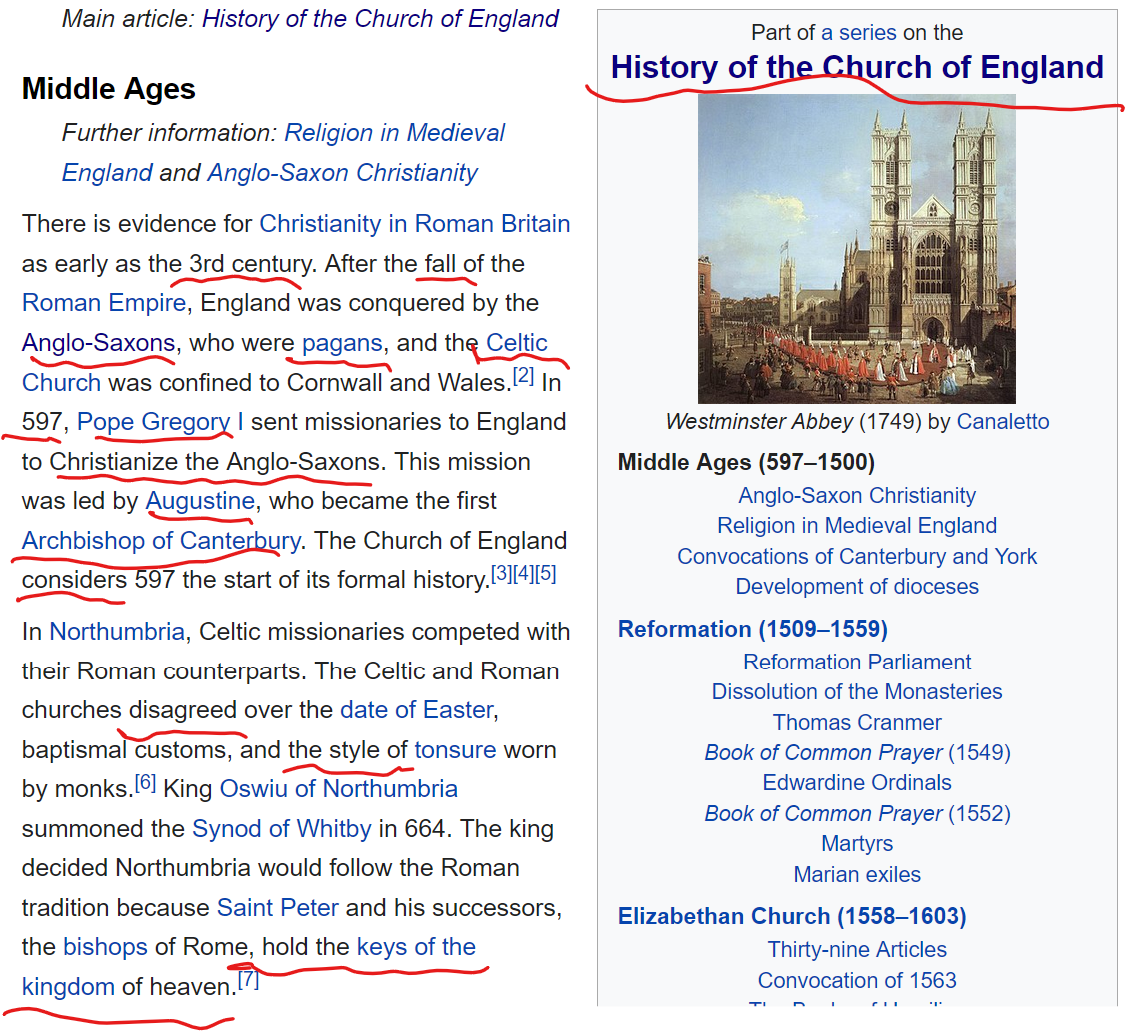Origin of Anglo-Saxons (Whitemen) (2022)
- explain Anglo-Saxon
- https://x.com/i/grok/share/rpMqwzOyHPDBK7HByOT7A3kaL
Definition
- The term "Anglo-Saxon" primarily refers to the Germanic peoples who migrated to and settled in Britain during the early Middle Ages, as well as the culture, society, and language they developed there.
- It combines "Angles" (from modern-day Schleswig-Holstein in Germany and Denmark) and "Saxons" (from northern Germany and the Netherlands), with the Jutes (from Jutland, Denmark) often included in the group.
- The name was popularized in the 8th century by the historian Bede in his *Ecclesiastical History of the English People*.
- In a broader sense, "Anglo-Saxon" describes the historical period in England from roughly 410 AD (the end of Roman rule) to 1066 AD (the Norman Conquest). Today, it's sometimes used colloquially to mean "English" or "white Protestant" in a cultural or ethnic sense, though this can carry outdated or pejorative connotations.
Historical Background
- Migration and Settlement (5th–6th Centuries): After the Roman Empire withdrew from Britain around 410 AD, the island faced invasions and instability from groups like the Picts, Scots, and Germanic tribes. The Angles, Saxons, and Jutes arrived as raiders, mercenaries, and eventually settlers, invited by Romano-British leaders to defend against other threats. They established kingdoms across what is now England, including Kent (Jutes), Wessex and Sussex (Saxons), and Northumbria and East Anglia (Angles).
- Kingdoms and Unification: By the 7th century, seven major kingdoms emerged (known as the Heptarchy: Northumbria, Mercia, East Anglia, Essex, Kent, Sussex, and Wessex). These were often at war, but Christianity's spread (starting with Augustine's mission in 597 AD) helped foster unity. Alfred the Great of Wessex (r. 871–899) resisted Viking invasions and is seen as the first "King of the English," laying groundwork for a unified England.
- End of the Era: The period ended with the Norman Conquest in 1066, when William the Conqueror defeated Harold Godwinson at the Battle of Hastings. This brought French-Norman influence, marking the shift to the Middle English period.
Culture and Society
- Religion: Initially pagan (worshipping gods like Woden and Thunor), the Anglo-Saxons converted to Christianity between the 6th and 8th centuries. Monasteries became centers of learning, preserving knowledge through illuminated manuscripts like the Lindisfarne Gospels.
- Daily Life: Society was hierarchical—kings, nobles (ealdormen and thegns), free peasants (ceorls), and slaves (theows). They were farmers, herders, and craftsmen, living in timber longhouses. Warfare was common, with a focus on heroic ideals of loyalty and bravery.
- Art and Literature: Known for intricate metalwork (e.g., the Sutton Hoo burial ship) and jewelry with animal motifs. Epic poetry like Beowulf (c. 8th–11th century) survives, celebrating warrior culture. Riddles, elegies (e.g., The Wanderer), and chronicles like the Anglo-Saxon Chronicle (started under Alfred) highlight their literary tradition.
- Law and Governance: Emphasized wergild (blood money to compensate for crimes) and folk moots (assemblies). Alfred's law code blended Christian and customary law, influencing later English legal traditions.
Language
Anglo-Saxon refers to Old English, a West Germanic language unrelated to modern French or Latin (despite Roman influence). It evolved from the tribes' dialects and included Norse elements from Viking settlements. Examples:
- Old English: "Hwæt! We Gardena in geardagum" (from Beowulf: "Listen! We of the Spear-Danes in days of yore").
- It gave English words like "house" (hūs), "bread" (brēad), and "king" (cyning).
By the 11th century, Old English began incorporating Norman French, leading to Middle English (as in Chaucer's works).
Legacy
- The Anglo-Saxon period shaped England's identity, from its parliamentary roots (in folk assemblies) to its linguistic foundation (about 85% of core English vocabulary is Germanic).
- Archaeological sites like Sutton Hoo and West Stow offer glimpses into their world.
- In modern times, "Anglo-Saxon" can evoke a romanticized view of English heritage but is critiqued for oversimplifying diverse migrations.
- For deeper dives, resources like the British Museum or translations of Beowulf (e.g., by Seamus Heaney) are excellent starting points.
Origin of Anglo-Saxons (Whitemen)


on whitemen
- Whitemen Obsession on Purity of Blood (2025-10)
- What is the Meaning of Whitemen? (2025-01)
- SJW. Operated by White, Colored by You (2020)
- Origin of Anglo-Saxons (Whitemen) (2022)
- History of the Word Caucasian (aka whitemen, europid) (2023)
- Susan Sontag on Whitemen (2016)
- Black Criminals Classified as Whitemen in USA Police Database (2024)
- Meditation, Whitemen Seeking Novelty (2013)
- Whitemen's Obsession with Pedo (2024)
- Whitemen and Racism. The Most Aggressive Race. (2025)
- Whitemen Think that America is Their Land (2025-10)